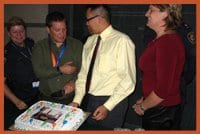The committee that pressured the police to create Ottawa’s Hate Crimes Unit is now on “very friendly” terms with the police. What once was confrontational is now a “partnership,” says Chris Luesby, the organization’s community coordinator.
This represents a sea change for the Police Liaison Committee to the GLBT Community.
“The liaison came out of table pounding and a list of demands,” says David Pepper, director of community development for the Ottawa Police Services. Pepper was a driving force in the original creation of the Police Liaison Committee to the GLBT Community before he was hired by the police.
The current committee’s comments are a far cry from “table pounding.”
“We’re not activists; we’re not there to create a political movement. It’s a partnership; we’re agreeing to work together on issues of a common interest,” says Luesby.
Three of the board’s most senior community members have close ties with the city or the police. Luesby is a municipal administrator. Darryl Lim says he is “interested” in joining the police, although he has not yet applied. And Christine Schulz has begun the application process to join the Ottawa Police. If hired, she will be the first openly trans police recruit in the city’s history.
Doug Janoff, author of Pink Blood: Homophobic Violence In Canada, has studied the role of liaison committees across the country.
“On this advisory committee, a lot of these people like the police and like what they’re doing,” says Janoff.
Both Luesby and Lim emphatically deny that this puts anyone in an ethical conflict of interest. But after a liaison meeting on Sep 21, Schulz acknowledged that her application put her into a difficult position and that she had stepped back from some of her involvement with the committee.
In the wake of a homophobic murder that sent waves of fear through Ottawa’s gay community, The Police Liaison to the GLBT Community was formed in 1991.
Designed in part to address the queer community’s fear of harassment and re-victimization in reporting bashings, the liaison helps bring community members to the police who might otherwise be to afraid to report incidents, Schulz says. One of the liaison’s greatest successes was the establishment of the Ottawa Police Hate Crimes Unit in 1993.
Ten years later, the liaison adopted new terms of reference that state they will “advocate on issues of importance to these communities and the police, [emphasis added].”
Now the advisory committee is “an information resource” to the police, says Lim.
The liaison’s conservative approach has led one researcher to say that the committee has lost its edge.
“What we see is basically two types of committees. Their participants are either are very adversarial, almost antagonistic, and then there are those who take a much more collaborative approach,” says Janoff.
Ottawa, Janoff says, has taken the latter route.
Members of the committee agree.
“The tone has changed from banging on the tables to looking at issues together,” says Lim, the community co-chair.
“I would rather the community engage with the police.”
There’s nothing wrong with adopting this model, says Janoff. But if a liaison committee is mainly a space for friendly conversations with police officers, others from the queer community need to step forward to take a more critical approach to policing.
“They are very sincere in what they’re doing and they’re very hardworking,” Janoff says. “But we have to ask whether there are other people who should be doing other kinds of work.”
If the approach of the committee or its membership needs adjustment, it’s up to the local queer community to step forward and do something about it.
“I will without hesitation remind people that the committee will be as good and as reflective as the community wants to make it,” says Pepper.


 Why you can trust Xtra
Why you can trust Xtra


